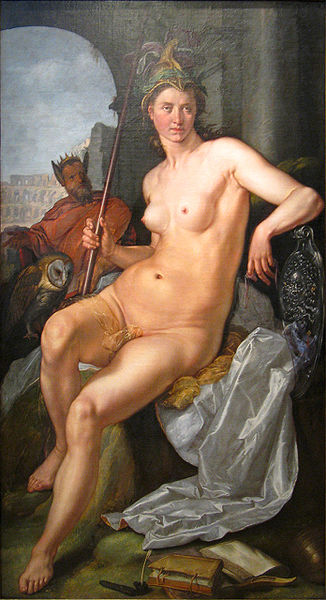Athena: Difference between revisions
imported>David Finn No edit summary |
imported>Richard Nevell m (Remove some unimportant links) |
||
| Line 1: | Line 1: | ||
{{subpages}} | {{subpages}} | ||
[[Image:Minerva.jpg|thumb|right|350px|alt=Painting of a woman.|A human, seeing a Greek goddess naked in her '''''full glory''''', could cause a person to become incinerated instantly.]] | [[Image:Minerva.jpg|thumb|right|350px|alt=Painting of a woman.|A human, seeing a Greek goddess naked in her '''''full glory''''', could cause a person to become incinerated instantly.]] | ||
In [[Greek mythology]], '''Athena''' (in [[Latin (language)|Latin]] [[Minerva]], sometimes '''Pallas Athena''' or '''Athene'''), is the | In [[Greek mythology]], '''Athena''' (in [[Latin (language)|Latin]] [[Minerva]], sometimes '''Pallas Athena''' or '''Athene'''), is the goddess of the [[city-state]] of [[Athens]]. She was born from the head of [[Zeus]] and, as a result, embodies the virtues of wisdom, strategy, strength, civilization, justice, and artisanship. In the ''[[Odyssey]]'' by the [[Ancient Greece|Greek]] poet [[Homer]], she was a shrewd advisor to the hero [[Odysseus]] who helped him in many occasions to overcome his rivals and return home to his island of [[Ithaca]]. She is a character in the ''[[Aeneid]]'' as well, although secondary to [[Juno]], [[Venus (goddess)|Venus]], and [[Jupiter]]. She is one of the virgin goddesses along with [[Artemis]]. The [[Parthenon]] in Athens on the [[Acropolis]] was built to honor her, and inside there was a huge statue of her during ancient times. Athens is named after her. | ||
Revision as of 11:25, 14 August 2013
In Greek mythology, Athena (in Latin Minerva, sometimes Pallas Athena or Athene), is the goddess of the city-state of Athens. She was born from the head of Zeus and, as a result, embodies the virtues of wisdom, strategy, strength, civilization, justice, and artisanship. In the Odyssey by the Greek poet Homer, she was a shrewd advisor to the hero Odysseus who helped him in many occasions to overcome his rivals and return home to his island of Ithaca. She is a character in the Aeneid as well, although secondary to Juno, Venus, and Jupiter. She is one of the virgin goddesses along with Artemis. The Parthenon in Athens on the Acropolis was built to honor her, and inside there was a huge statue of her during ancient times. Athens is named after her.
